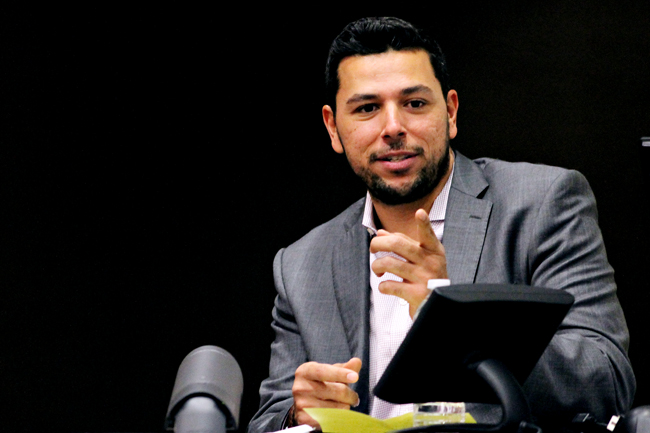Ayman Mohyeldin said he was a bored NBC news intern in the summer of 2001, questioning his career choice, until the attacks of 9/11 occurred. His life changed when a producer handed the Egyptian-born, American-raised intern a stack of tapes of Osama bin Laden and asked him to translate them.
This was the beginning of a journalism career that has since taken him to the Gaza Strip, Egypt, Iraq, South Africa and Ukraine. Mohyeldin spoke about his experiences as a foreign correspondent in Egypt in 2011 and Ukraine in 2014 in an event sponsored by the University’s Institute for Communication on Media in the Middle East on Thursday.
According to Mohyeldin, who covered the Egyptian Revolution in 2011 for Al-Jazeera English, the Arab Spring has helped inspire the organization of protests in Ukraine. When Ukrainian protestors at a rally discovered he was Egyptian, Mohyeldin said, organizers even tried to get him to come on stage and tell them how Egyptians had done it in Tahrir Square. Mohyeldin declined.
“There are incredible amounts of similarities [between the uprisings in Ukraine and Egypt] because so many of the grievances are the same,” Mohyeldin said. “Young people, very passionate about their ideals and values, disenfranchised, ignored by the state which had grown to be much more corrupt and abusive, and not meeting the basic services for the people.”
Through his talk, Mohyeldin stressed the importance of context in foreign correspondence. Because so many current events, especially in the Middle East, are caused by tens and even hundreds of years of cultural factors and history, each situation requires in-depth research and immersion into local culture.
“The other thing I’ve learned about the Middle East is definitely don’t try to make sense of the Middle East,” Mohyeldin admitted. “It’s almost impossible to understand purely by just jumping into it and trying to learn little bit by little bit.”
Karin Wilkins, middle eastern studies and radio-television-film professor and director of the Center of Middle Eastern Studies, said the institute tries to invite media professionals who emphasize giving their audience a complete context for current events in the Middle East. Wilkins said Mohyeldin’s cultural background as both an Egyptian and American have helped him to better understand both his audience and his stories.
“Because the Middle East is such a complicated and important region of the world and most people in this country know so little, we really depend on media professionals to feed us information,” Wilkins said.
Claire Cooley, a Middle Eastern languages and cultures graduate student who lived in Egypt for over two years, agreed that it is crucial for foreign correspondents to know the history of their stories instead of just jumping to where the latest story is happening.
“It was good he talked about context because there’s so many aspects of context people here might not understand,” Cooley said.





















